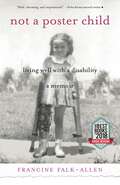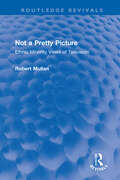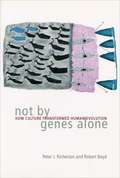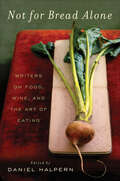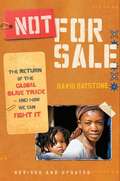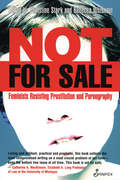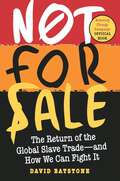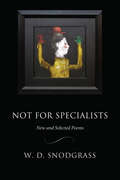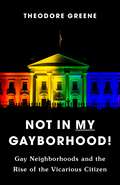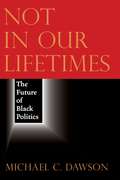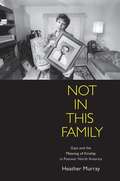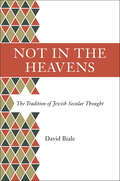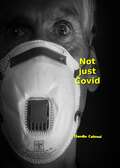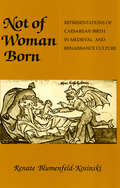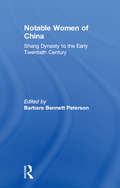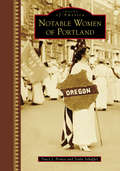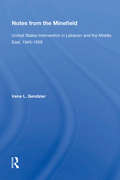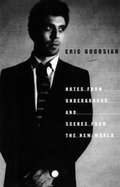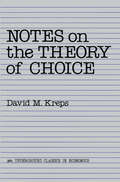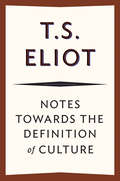- Table View
- List View
Not a Passing Phase: Reclaiming Lesbians in History, 1840-1985
by Lesbian History GroupA collection of essays and articles about "romantic friendships" between famous women of the past.
Not a Poster Child: Living Well with a Disability—A Memoir
by Francine Falk-Allen2019 Living Now Book Awards Gold Medal Winner in Inspirational/Memoir (Female) 2018 Sarton Women's Book Awards finalist in Memoir Kirkus Reviews' Best Books of 2018 2018 Sarton Women's Book Awards Silver Medal in Memoir Francine Falk-Allen was only three years old when she contracted polio and temporarily lost the ability to stand and walk. Here, she tells the story of how a toddler learned grown-up lessons too soon; a schoolgirl tried her best to be a &“normie,&” on into young adulthood; and a woman finally found her balance, physically and spiritually. In lucid, dryly humorous prose, she also explores how her disability has affected her choices in living a fulfilling (and amusing) life in every area—relationships, career, religion (or not), athleticism, artistic expression, and aging, to name a few. A clear-eyed examination of living with a handicap, Not a Poster Child is one woman&’s story of finding her way to a balanced life—one with a little cheekiness and a lot of joy.
Not a Pretty Picture: Ethnic Minority Views of Television (Routledge Revivals)
by Robert MullanOriginally published in 1996, ethnic minorities in the UK made up over 5% of the population yet were hardly represented in the hundreds of hours of terrestrial broadcast television each week. The blatant racism of The Black and White Minstrel Show was over, but more subtle forms of racism were piped into our living rooms in an endless stream of white-dominated programming. ‘Comedies’ and soaps presented non-whites as a sort of joke humanity – stereotypical, simple and amusingly childish. Serious programmes swelled on the negative aspects of ethnicity: race as a problem, cultural clashes and language barriers. Above all – not white equals not normal. For many years critics of popular television argued that such imbalance was harmful. The lack of positive non-white TV role models for children to identify with was leading to growing alienation and disaffection. Ethnic minorities increasingly defined themselves in opposition to white institutions. They were turning towards separate channels – narrow-casting – provided to meet their own TV needs. Based on both extensive survey research and interviews with actual viewers, Not a Pretty Picture investigates the whole issue of TV and ethnic minority viewers at the time: their viewing choices, their criticisms, their feeling about the way they are portrayed. The conclusions are damning: for most of Britain’s ethnic minority communities TV was a white medium, predominantly controlled by whites, portraying white culture and denying non-whites a voice. Not a Pretty Picture, however, provides a voice for these views and a valuable insight into the way ethnic minorities see TV. Today it can be read in its historical context, to see how far we have come, as well as what still needs to be done.
Not by Bread Alone: Social Support in the New Russia
by Melissa L. CaldwellThe book addresses the phenomenon of poverty in Russian today through an ethnography of a transnational soup kitchen community in Moscow.
Not by Genes Alone: How Culture Transformed Human Evolution
by Peter J. Richerson Robert BoydA groundbreaking theory of the role of culture in evolution, this book offers a radical interpretation of human evolution, arguing that our ecological dominance and our singular social systems stem from a psychology uniquely adapted to create complex culture.
Not for Bread Alone: Writers on Food, Wine, and the Art of Eating
by Daniel HalpernTwenty-two acclaimed writers celebrate the art of eatingWendell Berry • Colette • William Corbett • Michael Dorris • Alexandre Dumas • M. F .K. Fisher • Michael Frank • Betty Fussell • Evan Jones • Judith B. Jones • Barbara Kafka • Madeline Kamman • Charles Lamb • Rose Macaulay • Henry Matthews • Joyce Carol Oates • Francine Prose • Paul Schmidt • James Seay • Charles Simic • Edward Steinberg • Alice WatersThere is more to be gained from our daily bread than mere sustenance. Curiosity, romance, ritual, and insight can be as much a part of a meal as any of its edible ingredients. In this delectable collection of essays on fine food and drink, twenty-two renowned writers capture the gestures, the celebrations, and the moments in which food, wine, and the act of eating transcend their initial purposes to become something far greater. A window into the eating lives of a handful of our finest literary artists, Not for Bread Alone is a tasty and most satisfying delight—a true culinary classic.
Not for Sale
by David BatstoneHuman trafficking generates $32 billion annually and enslaves over 30 million people, half of them children. Award-winning journalist David Batstone, whom Bono calls "a heroic character," profiles the new generation of abolitionists who are leading the movement. This groundbreaking global report is now updated with the latest findings, new stories, and statistics that highlight what is being done to end this appalling epidemic--and how you can join the movement.
Not for Sale: Feminists Resisting Prostitution and Pornography
by Rebecca Whisnant Christine StarkIncluding the latest research on prostitution and pornography, this essay anthology shows how the sex industries harm those within them while undermining the possibilities for gender justice, human equality, and stable sexual relationships. From sex industries survivors to social activists and theorists such as Taylor Lee, Adriene Sere, and Kristen Anderberg, this volume asses from a feminist perspective the racism, poverty, militarism, and corporate capitalism of selling sex through strip clubs, brothels, mail-order brides, and child pornography.
Not for Sale: The Return of the Global Slave Trade—and How We Can Fight It
by David Batstone“Human trafficking is not an issue of the left or right, blue states or red states, but a great moral tragedy we can unite to stop . . . Not for Sale is a must-read to see how you can join the fight.” —Jim Wallis, author of God's Politics“David Batstone is a heroic character.” —BonoIn the revised and updated version of this harrowing yet deeply inspirational exposé, award-winning journalist David Batstone gives the most up-to-date information available on the $31 billion human trafficking epidemic. With profiles of twenty-first century abolitionists like Thailand’s Kru Nam and Peru’s Lucy Borja, Batstone tells readers what they can do to stop the modern slave trade. Like Kevin Bales’ Disposable People and Ending Slavery, or E. Benjamin Skinner’s A Crime So Monstrous, Batstone’s Not for Sale is an informative and necessary manifesto for universal freedom.
Not for Specialists: New and Selected Poems (American Poets Continuum)
by W.D. SnodgrassUntil the late 1970s, W. D. Snodgrass was known primarily as a confessional poet and a key player in the emergence of that mode of poetry in the late 1950s and early 1960s. Snodgrass makes poetry out of the daily neuroses and everyday failures of a man—a husband, father, and teacher. This domestic suffering occurs against a backdrop of more universal suffering which Snodgrass believes is inherent in the human experience. Not for Specialists includes 35 new poems complemented by the superb work he wrote in the Pulitzer Prize winning collection, Heart’s Needle, along with poetry from seven other distinguished collections.from "Nocturnes"Seen from higher up, it makes its first move in the low creekbed, the marshlands down the valley, spreading across the open hayfields, the hedgerows with their tops still lit, laps the roadbed, flows over lawns and gardens, past the house and up the wooded hillside back behind us till only some few rays still scythe between the treetrunks from the far horizon and are gone.W. D. Snodgrass, born in Pennsylvania in 1926, is the author of more than 20 books of poetry, including The Fuehrer Bunker: The Complete Cycle (BOA, 1995); Each in His Season (BOA, 1993); and Heart's Needle (1959), which won the Pulitzer Prize for Poetry. His other books include To Sound Like Yourself: Essays on Poetry (BOA, 2002), After-Images: Autobiographical Sketches (BOA, 1999) and six volumes of translation, including Selected Translations (BOA Editions, 1998), which won the Harold Morton Landon Translation Award.
Not from Here, Not from There/No Soy de Aquí ni de Allá: The Autobiography of Nelson Díaz
by Nelson A. DiazRaised in the squalor of a New York tenement until he was 10 years old, Nelson Díaz saw his life change when his family moved to a brand-new high-rise project in West Harlem in the 1950s. That experience, along with lessons learned as the only Latino law student at Temple University, would drive him throughout his life as a lawyer and activist, fighting for the expansion of rights for all Americans. “No soy de aquí ni de allá” is a mantra for Puerto Ricans who feel like foreigners wherever they are and who seek a place for themselves. In his inspiring autobiography, Not from Here, Not from There, Díaz tells the story of his struggles and triumphs as his perspective widened from the New York streets and law school classrooms to the halls of power in Philadelphia and Washington, DC. Whether as a leader in economic development, a pioneer in court reform, or a champion of fair housing, Díaz has never stopped advocating for others. Díaz was happy to be the first Latino to “do something,” but he never wanted to be the last. This story of an outsider who worked his way to the inside offers powerful lessons on finding a place in the world by creating spaces where everyone is welcome.
Not in My Gayborhood: Gay Neighborhoods and the Rise of the Vicarious Citizen
by Theodore GreeneGay neighborhoods are disappearing—or so the conventional story goes. In this narrative, political gains and mainstream social acceptance, combined with the popularity of dating apps like Grindr, have reduced the need for LGBTQ+ people to seek refuges or build expressly queer places. Yet even though residential patterns have shifted, traditionally gay neighborhoods remain centers of queer public life.Exploring “gayborhoods” in Washington, DC, Theodore Greene investigates how neighborhoods retain their cultural identities even as their inhabitants change. He argues that the success and survival of gay neighborhoods have always depended on participation from nonresidents in the life of the community, which he terms “vicarious citizenship.” Vicarious citizens are diverse self-identified community members, sometimes former or displaced locals, who make symbolic claims to the neighborhood. They defend their vision of community by temporarily reviving the traditions and cultures associated with the gay neighborhood and challenging the presence of straight families and other newcomers, the displacement of local institutions, or the taming of sexual culture. Greene pays careful attention to the significance of race and racism, highlighting the important role of Black LGBTQ+ culture in shaping gay neighborhoods past and present. Examining the diverse placemaking strategies that queer people deploy to foster and preserve LGBTQ+ geographies, Not in My Gayborhood illuminates different ways of imagining urban neighborhoods and communities.
Not in Our Lifetimes: The Future of Black Politics
by Dawson Michael C.In the aftermath of Hurricane Katrina, polls revealed that only 20 percent of African Americans believed that racial equality for blacks would be achieved in their lifetime. But following the election of Barack Obama, that number leaped to more than half. Did that dramatic shift in opinion really reflect a change in the vitality of black politics--and hope for improvement in the lives of African Americans? Or was it a onetime surge brought on by the euphoria of an extraordinary election? With Not in Our Lifetimes, Michael C. Dawson shows definitively that it is the latter: for all the talk about a new post-racial America, the fundamental realities of American racism--and the problems facing black political movements--have not changed. He lays out a nuanced analysis of the persistence of racial inequality and structural disadvantages, and the ways that whites and blacks continue to see the same problems--the disastrous response to Katrina being a prime example--through completely different, race-inflected lenses. In fact, argues Dawson, the new era heralded by Obama's election ist more racially complicated, as the widening class gap among African Americans and the hot-button issue of immigration have the potential to create new fissures for conservative and race-based exploitation. Bringing his account up to the present with a thoughtful account of the rise of the Tea Parties and the largely successful "blackening" of the president, Dawson ultimately argues that black politics remains weak--and that achieving the dream of racial and economic equality will require the sort of coalition-building and reaching across racial divides that have always marked successful political movements. Polemical but clear-eyed, passionate but pragmatic, Not in Our Lifetimes will force us to rethink our easy assumptions about racial progress--and begin the hard work of creating real, lasting change.
Not in This Family
by Heather MurrayMany Americans hold fast to the notion that gay men and women, more often than not, have been ostracized from disapproving families. Not in This Family challenges this myth and shows how kinship ties were an animating force in gay culture, politics, and consciousness throughout the latter half of the twentieth century.Historian Heather Murray gives voice to gays and their parents through an extensive use of introspective writings, particularly personal correspondence and diaries, as well as through published memoirs, fiction, poetry, song lyrics, movies, and visual and print media. Starting in the late 1940s and 1950s, Not in This Family covers the entire postwar period, including the gay liberation and lesbian feminist movements of the 1960s and 1970s, the establishment of PFLAG (Parents, Families, and Friends of Lesbians and Gays), and the AIDS crisis of the 1980s and 1990s. Ending her story with an examination of contemporary coming-out rituals, Murray shows how the personal that was once private became political and, finally, public.In exploring the intimate, reciprocal relationship of gay children and their parents, Not in This Family also chronicles larger cultural shifts in privacy, discretion and public revelation, and the very purpose of family relations. Murray shows that private bedrooms and consumer culture, social movements and psychological fashions, all had a part to play in transforming the modern family.
Not in the Heavens: The Tradition of Jewish Secular Thought
by David BialeThe story of the origins and development of a Jewish form of secularismNot in the Heavens traces the rise of Jewish secularism through the visionary writers and thinkers who led its development. Spanning the rich history of Judaism from the Bible to today, David Biale shows how the secular tradition these visionaries created is a uniquely Jewish one, and how the emergence of Jewish secularism was not merely a response to modernity but arose from forces long at play within Judaism itself.Biale explores how ancient Hebrew books like Job, Song of Songs, and Esther downplay or even exclude God altogether, and how Spinoza, inspired by medieval Jewish philosophy, recast the biblical God in the role of nature and stripped the Torah of its revelatory status to instead read scripture as a historical and cultural text. Biale examines the influential Jewish thinkers who followed in Spinoza's secularizing footsteps, such as Salomon Maimon, Heinrich Heine, Sigmund Freud, and Albert Einstein. He tells the stories of those who also took their cues from medieval Jewish mysticism in their revolts against tradition, including Hayim Nahman Bialik, Gershom Scholem, and Franz Kafka. And he looks at Zionists like David Ben-Gurion and other secular political thinkers who recast Israel and the Bible in modern terms of race, nationalism, and the state.Not in the Heavens demonstrates how these many Jewish paths to secularism were dependent, in complex and paradoxical ways, on the very religious traditions they were rejecting, and examines the legacy and meaning of Jewish secularism today.
Not just covid
by Claudio CalzoniNot just covid There are diseases that take precedence in the media and on social media while many others are set aside and almost forgotten, as if they were temporary and not very debilitating. Claudio Calzoni witnesses one of these through the notes of his diary, full of Poetry and suffering.
Not of Woman Born: Representations of Caesarean Birth in Medieval and Renaissance Culture
by Renate Blumenfeld-Kosinski"Not of woman born, the Fortunate, the Unborn"—the terms designating those born by Caesarean section in medieval and Renaissance Europe were mysterious and ambiguous. Examining representations of Caesarean birth in legend and art and tracing its history in medical writing, Renate Blumenfeld-Kosinski addresses the web of religious, ethical, and cultural questions concerning abdominal delivery in the Middle Ages and the Renaissance. Not of Woman Born increases our understanding of the history of the medical profession, of medical iconography, and of ideas surrounding "unnatural" childbirth.Blumenfeld-Kosinski compares texts and visual images in order to trace the evolution of Caesarean birth as it was perceived by the main actors involved—pregnant women, medical practitioners, and artistic or literary interpreters. Bringing together medical treatises and texts as well as hitherto unexplored primary sources such as manuscript illuminations, she provides a fresh perspective on attitudes toward pregnancy and birth in the Middle Ages and the Renaissance; the meaning and consequences of medieval medicine for women as both patients and practitioners, and the professionalization of medicine. She discusses writings on Caesarean birth from the twelfth and thirteenth centuries, when Church Councils ordered midwives to perform the operation if a mother died during childbirth in order that the child might be baptized; to the fourteenth century, when the first medical text, Bernard of Gordon's Lilium medicinae, mentioned the operation; up to the gradual replacement of midwives by male surgeons in the fifteenth and sixteenth centuries. Not of Woman Born offers the first close analysis of Frarnois Rousset's 1581 treatise on the operation as an example of sixteenth-century medical discourse. It also considers the ambiguous nature of Caesarean birth, drawing on accounts of such miraculous examples as the birth of the Antichrist. An appendix reviews the complex etymological history of the term "Caesarean section."Richly interdisciplinary, Not of Woman Born will enliven discussions of the controversial issues surrounding Caesarean delivery today. Medical, social, and cultural historians interested in the Middle Ages and the Renaissance, historians, literary scholars, midwives, obstetricians, nurses, and others concerned with women's history will want to read it.
Not the Marrying Kind: A Feminist Critique of Same-Sex Marriage (Palgrave Socio-Legal Studies)
by Nicola BarkerNot the Marrying Kind is a new and comprehensive exploration of the contemporary same-sex marriage debates in several jurisdictions including Australia, Canada, South Africa, the United Kingdom and the United States. It departs from much of the existing scholarship on same-sex marriage, which argues either for or against marriage for same-sex couples. Instead, this book begins from a critical analysis of the institution of marriage itself (as well as separate forms of relationship recognition, such as civil partnership, PaCS, domestic partnership) and asks whether and how feminist critiques of marriage might be applied specifically to same-sex marriage. In doing this, the author combines the theories of second wave feminism with insights from contemporary queer theory.
Not the Way It Really Was: Constructing the Tolai Past (Pacific Islands Monograph Series, No. #10)
by Klaus NeumannThe Tolai are a well-known people through an extensive body of ethnographic literature.
Notable Women of China: Shang Dynasty to the Early Twentieth Century
by Barbara Bennett PetersonThe collaborative effort of nearly 100 China scholars from around the world, this unique one-volume reference provides 89 in-depth biographies of important Chinese women from the fifth century B.C.E to the early twentieth century.
Notable Women of Portland
by Tracy J. Prince Zadie J. SchafferThe story of Portland, Oregon, like much of history, has usually been told with a focus on male leaders. This book offers a reframing of Portland’s history. Many women made their mark and radically changed the Oregon frontier, including Native Americans Polly Johnson and Josette Nouette; pioneers Minerva Carter and Charlotte Terwilliger; doctors Marie Equi, Mary Priscilla Avery Sawtelle, and Bethina Owens-Adair; artists Eliza Barchus and Lily E. White; suffragists Abigail Scott Duniway, Hattie Redmond, and Eva Emery Dye; lawyer Mary Gysin Leonard; Air Force pilot Hazel Ying Lee; politicians Barbara Roberts and Margaret Carter; and authors Frances Fuller Victor, Beverly Cleary, Beatrice Morrow Cannady, Ursula Le Guin, and Jean Auel. These women, along with groups of women such as “Wendy the Welders,” made Portland what it is today.
Notes From The Minefield: United States Intervention In Lebanon And The Middle East, 1945-1958 (History And Society Of The Modern Middle East Ser.)
by Irene L GendzierIrene Gendzier's critically acclaimed, wide-reaching analysis of post-World War II U.S. policy in Lebanon posits that the politics of oil and pipelines figured far more significantly in U.S. relations with Lebanon than previously believed. In 1958 the United States sent thousands of troops to shore up the Lebanese regime in the face of domestic opp
Notes From Underground
by Eric BogosianIncludes Bogosian's Notes from Underground, the "diary," of an increasingly disturbed and disturbing urban recluse, together with Scenes from the New World, an early dramatic work.
Notes On The Theory Of Choice
by David KrepsIn this book, Professor Kreps presents a first course on the basic models of choice theory that underlie much of economic theory. This course, taught for several years at the Graduate School of Business, Stanford University, gives the student an introduction to the axiomatic method of economic analysis, without placing too heavy a demand on mathematical sophistication.The course begins with the basics of choice and revealed preference theory and then discusses numerical representations of ordinal preference. Models with uncertainty come next: First is von Neumann?Morgenstern utility, and then choice under uncertainty with subjective uncertainty, using the formulation of Anscombe and Aumann, and then sketching the development of Savage's classic theory. Finally, the course delves into a number of special topics, including de Finetti's theorem, modeling choice on a part of a larger problem, dynamic choice, and the empirical evidence against the classic models.
Notes Towards the Definition of Culture: Notas Para La Definición De La Cultura (Raíces De Europa Ser.)
by T. S. EliotThis critique of modern society argues that culture must be organic, and cannot be planned or imposed. The word culture has been widely and erroneously employed in political, educational, and journalistic contexts. In helping to define a word so greatly misused, T. S. Eliot contradicts many of our popular assumptions about culture, reminding us that it is not the possession of any one class but of a whole society—and yet its preservation may depend on the continuance of a class system, and that a &“classless&” society may be a society in which culture has ceased to exist. Surveying the post–World War II world, Eliot finds evidence of decay in cultural standards in every department of human activity, and expects the phenomenon to continue. He suggests that culture and religion have a common root—and if one decays, the other may die too. In observing the superpowers of his day and the course of recent history, he reminds us that &“the Russians have been the first modern people to practise the political direction of culture consciously, and to attack at every point the culture of any people whom they wish to dominate.&” The appendix includes Eliot&’s broadcasts to Europe, ending with a plea to preserve the legacy of Greece, Rome, and Israel, and Europe&’s legacy throughout the last two thousand years. &“Behind the urbanity, the modesty, the mere good manners of Mr. Eliot&’s exposition, one cannot mistake the force and significance of what he has to say, or ignore that it constitutes a fundamental attack on most of our assumptions on the subject.&” —The Spectator

